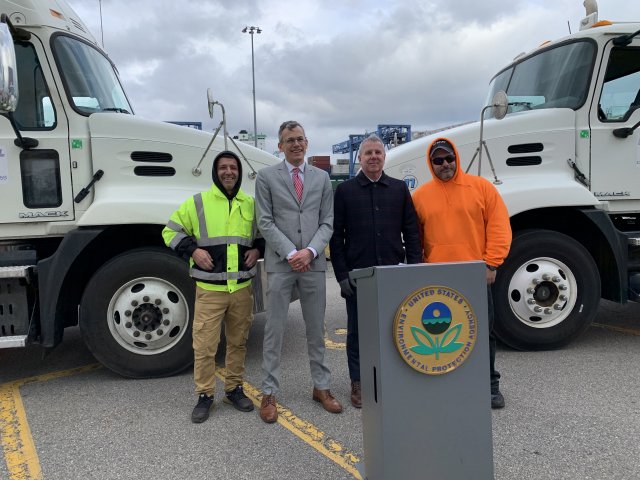EPA Celebrates Massport Efforts to Add Cleaner Emissions Trucks
EPA Also Seeking Input on Initiative for Cleaner Emission Standards for Heavy-Duty Trucks
BOSTON - U.S. Environmental Protection Agency (EPA) Regional Administrator Dennis Deziel toured Massport's Conley Terminal today and reviewed their efforts to promote and transition to cleaner emission heavy-duty trucks. Nationwide, EPA is also taking concrete steps to advance the Cleaner Trucks Initiative, a rulemaking that will establish new, more stringent emission standards for oxides of nitrogen (NOx) and other pollutants for highway heavy-duty engines. Through this Advance Notice of Proposed Rulemaking (ANPR), EPA is seeking input from the public and interested stakeholders.
Massport has for many years used EPA grant funding to transition ground support vehicles at Logan Airport and heavy-duty trucks used at Conley Terminal to lower-emission diesel equipment. At the Conley Terminal shipping facility alone, Massport has worked with the EPA to repower five rubber tire gantry cranes, and has implemented a program to replace nearly 90 drayage trucks operating at Conley Terminal with vehicles that meet tighter EPA emissions standards.
"EPA New England is proud of our lengthy track record partnering with Massport on efforts to protect workers, the local community and our regional air quality by taking concrete steps to reduce air pollution from heavy-duty trucks at these Massachusetts-based facilities," said EPA New England Regional Administrator Dennis Deziel. "EPA is eager to hear from interested parties as we proceed with the ANPR to establish new, more stringent emission standards for NOx and other pollutants for highway heavy-duty engines."
"Since 2011, our business partners at Conley Terminal have renovated 89 trucks through EPA's voluntary program, resulting in the reduction of tons of emissions on our neighboring communities. Massport will continue to be proactive and support programs that reduce the environmental impacts of the Port and are business friendly," said Massport Port Director Mike Meyran.
EPA intends to publish a proposed rule in early 2020 to establish new, more stringent emission standards for highway heavy-duty engines. EPA's Cleaner Trucks Initiative rulemaking process will also offer opportunities to streamline and improve certification procedures to reduce costs for engine manufacturers. This action follows on the petitions from over 20 organizations, including state and local air agencies, to revise and promulgate more stringent NOx standards.
"The Trucking industry touches nearly every part of our economy. A strong and resilient trucking industry is imperative to maintaining a strong and resilient economy. Through this initiative, we will modernize heavy-duty truck engines, improving their efficiency and reducing their emissions, which will lead to a healthier environment," said EPA Administrator Andrew Wheeler. "The U.S. has made major reductions in NOx emissions, but through this initiative we will continue to reduce emissions, while spurring innovative new technologies, ensuring heavy-duty trucks are clean and remain a competitive method of transportation."
From 2007 to 2017, U.S. NOx emissions dropped by more than 40 percent, but there is more work to be done. Today, over 100 million people live in areas of nonattainment for ozone and particulate matter (PM), and according to EPA estimates, heavy-duty vehicles will continue to be one of the largest contributors to NOx emissions — a precursor of ozone and PM formation — from the transportation sector in 2025. Updating these standards will result in significant mobile source NOx reductions, which will aid communities across the country in achieving ozone and particulate matter attainment with EPA's National Ambient Air Quality Standards program.
EPA last revised NOx standards for on-highway heavy-duty trucks and engines in January 2001. Pursuant to the Clean Air Act, the CTI will provide manufacturers sufficient time to comply with new standards and ensure that updated standards consider feasible emissions control technologies. Working together with state and industry partners, we can achieve environmental results through the pursuit of commonsense regulations that encourage economic growth.
More information on EPA's Cleaner Trucks Initiative: https://www.epa.gov/regulations-emissions-vehicles-and-engines/advance-notice-proposed-rule-control-air-pollution-new

Download Hi-Res Photo.
